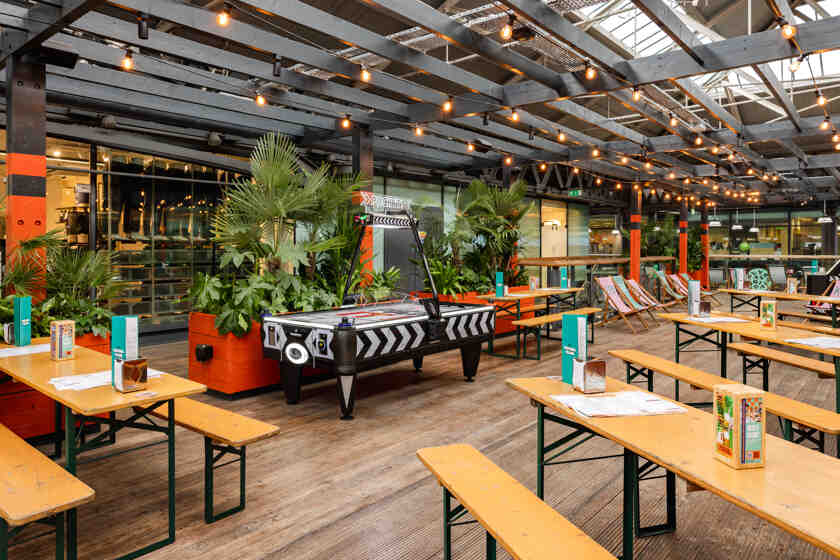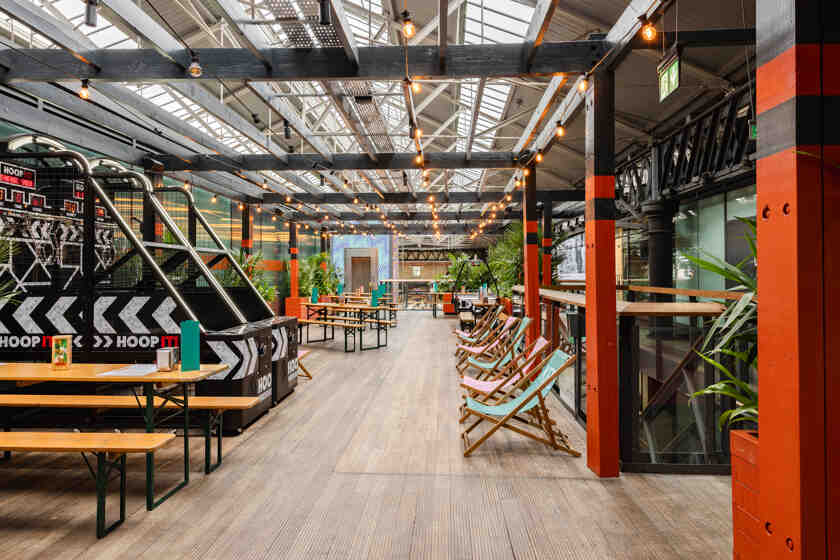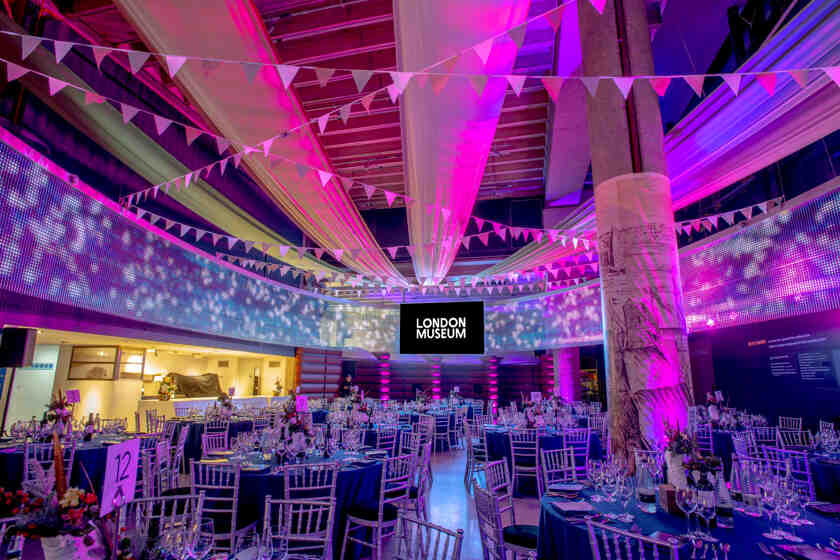Top Trending Rehearsal Spaces in London for 2025
Looking for rehearsal spaces in London? Our platform connects you with a diverse range of venues, from RADA rehearsal spaces to affordable East London theatres. Whether you need a space for large dance rehearsals, modern contemporary performances, or a blank canvas theatre, we have options to suit every style and budget.
- Portobello /ladbrokegrove/nottinghillResponds within 24 hoursFrom £500per hourStanding450Theatre120Cabaret60Dining160Boardroom33
- Liverpool StreetResponds within 24 hoursFrom £250per morningStanding600Theatre300Cabaret300Dining300
- PaddingtonResponds within 12 hoursFrom £75per hourStanding400Theatre350Cabaret140Dining230Boardroom30
- West LondonResponds within 8 hoursFrom £500per morningStanding700Theatre100Cabaret50Dining240Boardroom44
- Shoreditch / HoxtonResponds within 4 hoursFrom £2,150per dayStanding610Theatre330Dining310
- ShoreditchResponds within 2 hoursFrom £900per dayStanding60Theatre60Cabaret24Dining40Boardroom24
- CamdenResponds within 4 hoursFrom £450per dayStanding600Theatre550Cabaret300Dining340Boardroom200
- ShoreditchResponds within 8 hoursFrom £3,000per dayStanding200Theatre50Dining140
- BarbicanResponds within 8 hoursFrom £84per dayStanding800Theatre300Cabaret300Dining400Boardroom30
- Old StreetResponds within 12 hoursFrom £3,300per dayStanding330Theatre200Cabaret120Dining180Boardroom60
- SouthwarkResponds within 8 hoursFrom £80per hourStanding60Theatre60Cabaret50Dining55Boardroom25
- London BridgeResponds within 4 hoursFrom £60per hourStanding100Theatre50Cabaret50Dining50Boardroom25
- BarbicanResponds within 4 hoursFrom £5,000per dayStanding600Theatre350Cabaret210Dining240Boardroom102
- ShoreditchResponds within 12 hoursFrom £110per dayStanding1206Theatre620Cabaret346Dining510Boardroom216
Most Popular Rehearsal Spaces in London
Rehearsal Spaces in London: Where Creativity Comes to Life
London has always been a city of performance, from its West End theatres and underground music clubs to contemporary dance studios and film rehearsal hubs. Whether you are a band prepping for a tour, a theatre company fine-tuning a new script, or a dance troupe in need of mirrors and sprung floors, the capital offers an incredible range of rehearsal spaces in London to suit every creative need.
In this guide, we explore some of the best rehearsal studios, flexible hire spaces, and hidden gems across the city, perfect for artists, performers, and production teams.
Why London Is the Ultimate City for Rehearsals
London’s cultural heartbeat makes it one of the best places in the world for creative preparation. The city’s diverse array of venues, from state-of-the-art studios to character-filled warehouses, means there’s something for every project and budget.
Theatre groups can find dedicated drama studios close to the West End, musicians have access to fully equipped soundproof rehearsal rooms, and dancers can take advantage of light-filled studios with professional flooring.
Being close to London’s major transport links also means artists can move easily between rehearsals, performances, and productions. Areas like Camden, Shoreditch, Peckham, and Southwark have become creative hubs for this reason, each with its own artistic personality.
Top Types of Rehearsal Spaces in London
1. Music Rehearsal Studios
Musicians and bands looking for rehearsal studios in London are spoilt for choice. Many studios come with professional soundproofing, drum kits, amplifiers, and recording options.
The Premises Studios, Hackney: A London institution with decades of music history, this studio has hosted names from Adele to Arctic Monkeys. Its mix of large and small rooms suits both full-band rehearsals and solo sessions.
Pirate Studios (various locations): These 24-hour, self-service studios are perfect for flexibility. You can book online, access the space with a code, and practice at any hour—ideal for musicians with busy schedules.
Abbey Road Institute, St John’s Wood: Known globally for its recording history, this area also offers smaller rehearsal spaces nearby that channel the same creative spirit.
These music rehearsal spaces in London cater to a range of budgets and styles, from up-and-coming artists to seasoned professionals.
2. Dance Rehearsal Studios
If you’re a dancer, choreographer, or movement director, London’s dance rehearsal venues offer bright, open studios with professional flooring and full-length mirrors.
The Place, Euston: One of the UK’s leading dance centres, The Place offers multiple rehearsal studios available for hire, all equipped with Harlequin floors, sound systems, and natural light.
Studio Wayne McGregor, Stratford: A sleek, modern complex within Here East, featuring beautiful, minimalist studios that attract world-class choreographers.
Base Studios, Vauxhall: A favourite among commercial dancers and performers, this studio is perfect for group rehearsals, auditions, and filming dance content.
These dance rehearsal spaces in London are also popular for workshops and creative residencies.
3. Theatre and Acting Rehearsal Spaces
From intimate black-box studios to full-size rehearsal rooms mirroring stage dimensions, theatre rehearsal spaces in London are designed to bring scripts and performances to life.
Old Diorama Arts Centre, Regent’s Place: Offers affordable rehearsal rooms and theatre spaces in the heart of London, often used by emerging theatre companies.
The Cockpit, Marylebone: A venue that doubles as both a theatre and rehearsal hub, complete with lighting rigs and staging equipment.
Southwark Playhouse Rehearsal Rooms: Situated close to London Bridge, these rooms provide spacious and flexible layouts ideal for ensemble rehearsals.
Theatre professionals appreciate being close to London’s vibrant performance districts, where collaboration and inspiration flow easily.
4. Film and TV Rehearsal Venues
For film crews, production companies, and casting directors, rehearsal venues in London with adaptable layouts and privacy are crucial.
Fount Studios, Hackney: A modern warehouse conversion perfect for film rehearsals, screen tests, and production meetings.
Big Sky Studios, Caledonian Road: Offers high-end studio space ideal for commercials, music videos, or film rehearsals.
Mount Pleasant Studio, Clerkenwell: Known for its versatility, it features professional lighting setups and private rehearsal areas for production teams.
Many of these venues also double as shoot locations, making them practical for pre-production and testing scenes.
Unique and Creative Rehearsal Spaces in London
London’s artistic scene thrives on diversity, and that extends to its more unconventional rehearsal options.
Warehouse Rehearsal Venues: Converted warehouses in areas like Hackney Wick, Bermondsey, and Tottenham provide large, flexible spaces perfect for theatre companies or dance collectives. These industrial event spaces in London offer a blank canvas feel that can be customised for creative use.
Community Halls and Arts Centres: Spaces such as Battersea Arts Centre or Jacksons Lane in Highgate bring a sense of community to creative rehearsal projects, supporting local talent and emerging artists.
Private Members’ Clubs and Event Spaces: For higher-end rehearsals or corporate productions, venues like Century Club in Soho or Shoreditch House offer privacy, amenities, and central London convenience.
These blank canvas venues in London can adapt easily to different creative processes, whether that’s choreography, script readings, or music composition.
Rehearsal Spaces by Area
1. Central London
Areas like Soho, Covent Garden, and Fitzrovia are packed with rehearsal studios in Central London. You’ll find professional-grade facilities close to major transport hubs and performance venues. Ideal for theatre groups working near the West End or media teams operating out of Fitzrovia’s production houses.
2. East London
Known for its creative energy, East London is home to many industrial rehearsal spaces. From Shoreditch’s converted lofts to Hackney Wick’s artistic warehouses, the vibe here is independent and experimental.
3. South London
Southwark, Brixton, and Peckham host a thriving scene of dance and performance studios. These South London rehearsal venues often feature open layouts and artistic collaborations between dance companies, musicians, and filmmakers.
4. North London
Camden and Islington continue to attract musicians and theatre troupes. The rehearsal spaces in North London often combine heritage with creative flair, from vintage recording rooms to newly refurbished studios.
5. West London
For those seeking larger or more polished options, West London has studios catering to touring artists and production houses. Shepherd’s Bush and Notting Hill feature large rehearsal spaces in London with professional facilities and easy motorway access for logistics.
How to Choose the Right Rehearsal Space
Finding the perfect rehearsal venue depends on your project type, group size, and technical needs. Consider:
1. Location: Proximity to your performance venue or transport hubs.
2. Facilities: Soundproofing, mirrors, lighting, or recording equipment.
3. Budget: Many spaces offer hourly rates, day rates, or membership schemes.
4. Flexibility: Whether you can rearrange layouts or extend hours.
5. Atmosphere: Creative energy matters—choose a space that inspires productivity.
A good rehearsal space should feel comfortable, functional, and creatively charged. Whether you’re working on a West End musical or an indie film, the right environment can elevate your performance.
The Rise of Hybrid and Digital Rehearsals
Since 2020, many rehearsal venues in London have adapted to include hybrid options. Studios now come equipped with cameras, microphones, and screens for remote direction or digital auditions. This is particularly useful for international collaborations and production teams working across cities.
Venues like Sadler’s Wells and The National Theatre have pioneered hybrid rehearsal models, proving that technology and artistry can coexist beautifully.
Show More+
Popular areas for rehearsal space venues in london
- Angel
- Bankside
- Barbican
- Bermondsey
- Bethnal Green
- Borough
- Cambridge Heath
- Central London
- Clerkenwell
- Dalston
- East London
- Elephant and Castle
- Farringdon
- Finsbury
- Hackney
- Hackney Central
- Haggerston
- Holborn
- Hoxton
- Islington
- Islington Borough
- Kings Cross
- Liverpool Street
- London Bridge
- Mile End
- Moorgate
- North East London
- North London
- Old Street
- Shoreditch
- South Bank
- South East London
- South London
- Southwark
- Southwark Borough
- Spitalfields
- The West End
- Tottenham Court Road
- Tower Bridge
- Waterloo
- Westminster
- Whitechapel
Show More+
FAQs Rehearsal Spaces in London
Most professional music rehearsal spaces are soundproofed to avoid disturbing neighbours and to give a clean sound environment.
Rates vary widely depending on the size, facilities, and location. Small studios can start from around £20 per hour, while larger professional spaces in Central London can range from £50 to £150 per hour.
Some, like Pirate Studios, offer 24/7 access for complete flexibility, while others operate within standard opening hours.
Absolutely. London has several large warehouse event venues and theatre-style rehearsal spaces that can handle big casts or production teams.
Some do, but always check in advance. Mirrors, PA systems, lighting rigs, or even furniture may not be included in the base rate.































































